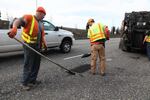Oregon lawmakers got their first look at a proposed $8 billion transportation funding package Monday night. The money would come from a higher gas tax, higher vehicle registration fees, new taxes on cars and bicycles, and a statewide payroll tax. The $8 billion would come in over the next decade, with work on some congestion relief projects starting as soon as next year.
"If we want to solve the transportation problem that people told us they want to solve, this is what gets us there," said Sen. Lee Beyer, D-Springfield. "This is the minimum that gets us there, that keeps the roads from failing, gets at the bridges, gets at the seismic issues."
Related: Half Of Oregon's Critical Bridges Could Collapse In Quake
The bulk of the money would go toward untangling highway choke points on key freight and commuter routes, including along most of the freeways in the Portland area. The package also contains funding for mass transit, although lawmakers specified it would not go toward expanding light rail. There's also money in the package for bicycle and pedestrian paths and seismic upgrades to earthquake-vulnerable bridges.
The proposal also opens the door to putting tolls on highways in the Portland area. It would also implement higher registration fees on vehicles with higher-than-average fuel efficiency. Crafters of the proposal say that's because owners of those vehicles pay less, on average, in fuel taxes than other drivers.
The final package could look different than the one unveiled Monday, as the committee debates the details over the coming weeks and holds public hearings. But Rep. Cliff Bentz, R-Ontario, told fellow lawmakers that the time is coming soon for them to take a public position on the key elements of the proposal
"There's no more hanging back. There's no more hiding in the weeds," he said. "We've reached that point."
The legislative session is scheduled to wrap up in early July. But the transportation plan will likely be hundreds of pages long when written into bill form. Rep. Greg Smith, R-Heppner, said he would need as much time as possible to come to a decision.

An Oregon Department of Transportation crew fills potholes on Highway 26 in this April 14, 2017, file photo.
Julie Sabatier / OPB
"We're going to need a little time to go through this, and to make sure that this is right, not only for our district but for the state of Oregon," he said.